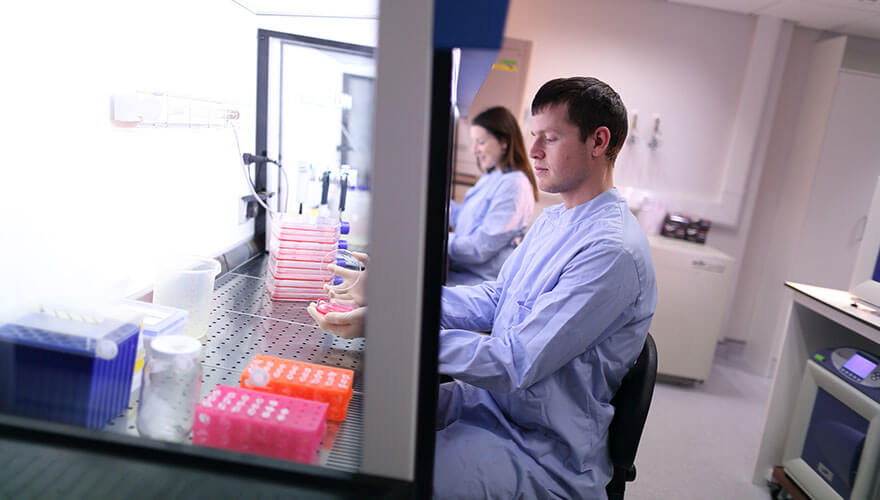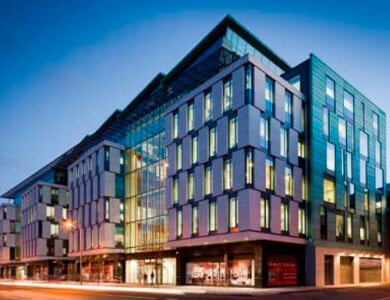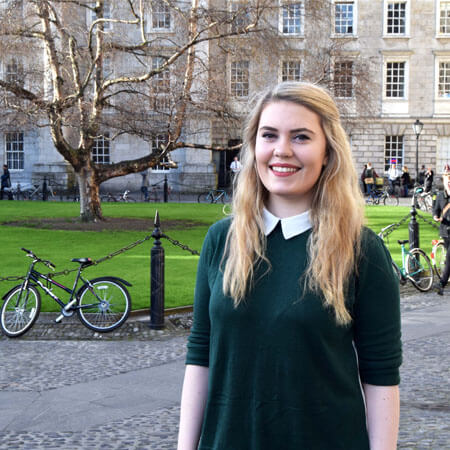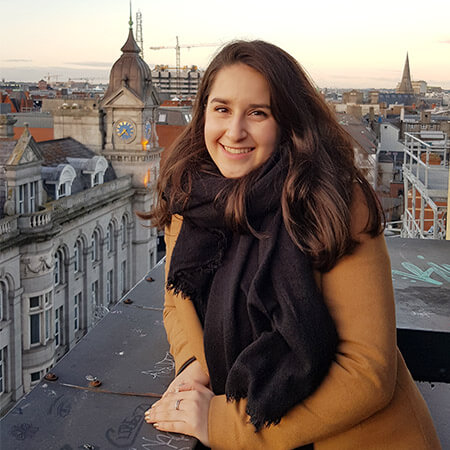Meet leading immunologist Luke O’Neill
Luke O’Neill is a professor of biochemistry at the School of Biochemistry and Immunology at Trinity College Dublin. He is also a founder and investigator at the Trinity Biomedical Sciences Institute (TBSI). And one of the world’s leading immunologists.
During the Covid-19 pandemic, he enjoyed superstar status as he became a leading expert on the disease and spoke to the nation through their TV sets almost daily. TBSI was at the forefront of research to fight the pandemic. O’Neill’s lab even explored the anti-viral effects of a metabolite called itaconate on Covid-19 in lung cells.
However, Dublin.ie interviewed Luke O’Neill three years before all this. He kindly shared his insights on everything from scientific literacy through to fascinating diseases. Here’s what he told us.
Among the world’s greatest explorers
As Professor Luke O’Neill discovered, when you become a fellow of the extremely exclusive and august science club that is the Royal Society, you have to sign their book.
Previous signatories include Newton, Boyle, Freud and Einstein. Oh! And world famous astrophysicist Brian Cox. This makes the process rather nerve-wracking, according to O’Neill. “There’s a practice! You don’t want to smudge your name,” he says.
He’s joined a long list of great minds, but they’re a rather diverse bunch too. So what do they all have in common?
We are explorers, that’s our job.
“Science is trying to find stuff out. You can call it exploration, you can call it pioneering, frontier stuff because it’s all about making discoveries,” he says. “We are explorers, that’s our job, that’s what attracted me to it. I wanted to see something nobody’s seen before.”
Luckily enough for O’Neill and his colleagues, in his lab they’ve made three big discoveries that have had a big impact within their field.
“We explored the immune system and saw things there for the first time,” he says. “There’s a whole new pathway or process discovered. And, of course, the thrill would be if that was a dysfunction or a disease, because then you might try and correct it. Once you find the enemy, you might be able to design a new medicine that might beat it.”

Students at work in the research laboratory at TBSI
What attracted him to immunology?
O’Neill’s path to the field of immunology wasn’t exactly linear. In fact, he describes himself as “a bit of a schizophrenic!”
“I was interested in chemistry anyway and biochemistry is chemistry writ large. If you want to understand something you’ve got to understand the chemical basis for things. And biochemistry is the basis for life,” he explains. “If we understand the chemicals of life, wouldn’t that be a thrilling thing?”
While other areas of science interest him, he wanted to deal with the fundamentals. Genetics, for example, wouldn’t quite cut it for him.
The first disease I was into was Crohn’s disease.
“Geneticists don’t really go beyond the genes, you know,” he says. “Genes make proteins, but what do they do? I was always obsessed with true mechanism – the underlying mechanism, the very basics of how things work. I’ve always been obsessed with molecular things in a sense.”
So why immunology? It all began with an interest in inflammation and the body’s process of fighting against things that can harm it.
“When you have an injury say, or an infection, you have this inflammatory response – and that got my imagination,” he says.
The Professor’s research to date
What’s going on there? he wondered. What are the cells, the molecules, the regulators of inflammation? These simple questions formed the basis of his research.
“Now, obviously inflammation’s a very important part of the immune system, because you need it to help you fight infection,” he says. “But then, it gets even better. Because it turns out that in many diseases this system goes awry and you get really bad, chronic inflammation attacking your own tissues.”
“The first disease I was into was Crohn’s disease, an inflammatory bowel disease,” he says. “Then, I did my PhD in arthritis and then that really got my interest, I suppose.”
And, suddenly, we had money.
And so began his slide into scientific research. To date, O’Neill has spent his entire career trying to gain a molecular understanding of immunity and inflammation. He wants to figure out why the human body has auto-immune responses and, on occasion, attacks itself.
“Take a disease like arthritis, for instance. For some reason your own inflammatory process goes crazy and begins to attack your joints and they get red and swollen and sore – just like there’s an infection there,” he says. “Your immune system turns on its own tissues. We’re trying to find out why.”
Dublin’s transformation into an immunology hub
O’Neill reckons that Dublin hasn’t always been a great place to study immunology. “Irish research was pretty poor up to the early 2000s,” he says.
However, since then, the city has really come into its own as a great place to be studying or working in immunology. So what changed?
“SFI was invented,” he says. “And, suddenly, we had money. Now, Ireland’s in the premier league for immunology… simply because money was put into it.”
SFI – or Science Foundation Ireland – is a statutory body that funds basic and applied research in the areas of science, technology, engineering and maths. Since it was set up in 2003, O’Neill says the city has been able to attract some really great immunologists. And, in turn, this has helped educate students to be top-class immunologists too.
Now, Ireland’s in the premier league for immunology.
“Most of my people I’ve had in my lab are Irish, from Dublin, who’ve done PhDs with me,” he says. “I couldn’t have done that unless I had money to fund my research, so SFI were key to all this. And that was the turning point in many ways.”
More recently, Ireland has become a leader in immunology. “And that’s mainly based in Dublin because most of the activity’s here,” says O’Neill. “We’ve gone up the league tables in several areas – microbiology, nanotech – there’s certain areas of science that Ireland’s really delivering on internationally.”
Since we spoke to O’Neill, this point has been driven home by newly released data. In 2020, SFI’s annual report found that Ireland ranked first in the world for immunology research. That’s because, the previous year, its researchers took part in 2,894 academic collaborations and 1,860 industry collaborations – more than half of which involved Irish-based companies.
It also ranked in the top five across a number of other disciplines, including agricultural sciences, neuroscience and material sciences.
The importance of scientific literacy
As well as SFI, O’Neill believes a big part of Ireland’s scientific success lies with its school system.
“I think we’re doing better than in the UK, for instance, because our range of subjects stays broader up to an older age,” he explains. “Most kids are exposed to science up to the age of 15, 16, at a minimum – and the UK isn’t like that. So I think we can give a big thumbs up… to what we’re doing here.”
He believes that the more the general public knows, the better. “There’s big things coming down the track that science is driving. And why wouldn’t people have their opinion on them and make decisions based on at least some knowledge of these things? That’s one of the reasons for education,” he says.
Big things, we wonder? Well, there’s climate change for one. “We all might drown” says O’Neill. In future, he also thinks there will be lots of ethical dilemmas relating to the likes of IVF and reproductive medicine. “All kinds of ethical things [are] coming up all the time,” he says.
And, when he was speaking, he didn’t even know about the tidal wave of public debate that Covid-19 would cause.

Research at TBSI
“You want to have as well-educated a populace as you can get,” he says. “Because, one, they can have an opinion on things when they’re very serious and that can come into democracy and who you vote for, for example. And, secondly, because every aspect of society needs an educated work force to allow for growth and development.
“The whole history of progress is educational in a way. Without education, you wouldn’t have had the scientists, you wouldn’t have had the engineers, the business people – all that stuff needs education”.
As O’Neill sees it, education has brought less war, less death and less destruction. For him, an educated work force also means more affluence and less poverty. “In 1930, 30% of the world was illiterate, now 90% are literate,” he says.
The old and the new
We sit in a café on Pearse Street, close to Trinity. However, it is also just across the way from Patrick Pearse’s old family home. In fact, the street is named after him and his brother, William.

TBSI campus, Pearse Street, Dublin.
And O’Neill says he sees a clear connection between the city’s history and Trinity’s medical research. TBSI is built close to the site of the tenements where hundreds would have died from TB not so long ago.
“There’s certainly been a revolution there. And in medical history itself,” he says. “Dublin and Trinity has a long tradition of discoveries and advances – from the popularisation of the stethoscope to the discovery of a drug to treat leprosy.”
In fact, researchers at TBSI and St James’s Hospital made a breakthrough in understanding how our immune systems respond to TB back in 2016. And, since then, they’ve had a hand in developing new treatments for the disease too.
Thanks to Professor Luke O’Neill and Katie Byrne at Trinity College Dublin. You can find out more about TBSI’s work on the university’s website.


